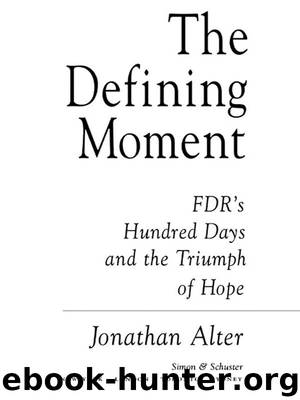The Defining Moment by Jonathan Alter

Author:Jonathan Alter
Language: eng
Format: epub
Publisher: Simon & Schuster
The “fear itself” phrase brought forth little crowd or press reaction. Within days it began being quoted more often but it didn’t become famous until the 1936 campaign, when Democrats emblazoned it everywhere as a way to show FDR’s success in having rescued the country. They knew it had resonated, especially in the mail received in the days and weeks following the Inauguration. *
The line was a specimen of inspired nonsense, no different in substance than Hoover’s jawboning, except for the fact that it came from a different jaw, one jutting confidently. If FDR were truly showing “candor” and speaking “the whole truth, frankly and boldly,” why would he pretend that the only thing the United States had to fear was fear itself? Some of the terror was irrational, but there were plenty of other real things to fear: the loss of one’s fortune or job or dignity, not to mention the consequences to family and health. Some fears—like the panic of the wealthy over what Roosevelt would do with their gold—were misplaced; others—worry over putting food on the table—were immediate. The widespread fear of a collapse of the banking system was neither “nameless,” “unreasoning,” nor “unjustified.”
All of this is true and irrelevant. Great leadership—like great theater—is often about the suspension of disbelief, the audience’s surrender of questions, an embrace of hope and redemption. Though they didn’t immediately recognize the power of the “fear” line, tens of thousands of people on the Capitol grounds and tens of millions listening on the radio sensed from the first paragraph that they and their country might go somewhere better.
That was the message for the heart. More visceral were FDR’s attacks on men of high finance. They had failed through “stubbornness” and “incompetence” and they had now “abdicated.” In what Arthur Krock called a “fighting, Jacksonian speech,” Roosevelt confronted them. “They know only the rules of a generation of self-seekers. They have no vision, and when there is no vision the people perish.”
Then, in a phrase that came to him in church in Hyde Park, the president evoked Mark 11:15: “The money changers have fled from their high seats in the temple of our civilization. We may now restore that temple to the ancient truths.” By keeping his targets philosophical—“the falsity of material wealth as the standard of success,” “the mad chase of evanescent profits”—FDR met the country’s anger and dissipated its rage. Without mentioning his cousin Theodore, he conjured his turn-of-the-century ripostes against businessmen.
The scapegoats were pivots for his main theme, which he repeated three times: “This nation is asking for action, and action now.” “We must act, we must act quickly.” The people want “direct, vigorous action.” In the argot of a later age, Roosevelt was relentlessly on message.
The action Roosevelt proposed was: put people to work, raise farm prices, boost purchasing power, prevent foreclosures, “national planning,” “strict supervision of all banking and credits and investment,” and “an end to speculation with other people’s money.” FDR knew that he would have to do more than urge action, however eloquently; he must act—and soon.
Download
This site does not store any files on its server. We only index and link to content provided by other sites. Please contact the content providers to delete copyright contents if any and email us, we'll remove relevant links or contents immediately.
| American Revolution | Civil War |
| US Presidents |
Fanny Burney by Claire Harman(26603)
Empire of the Sikhs by Patwant Singh(23086)
Out of India by Michael Foss(16853)
Leonardo da Vinci by Walter Isaacson(13336)
Small Great Things by Jodi Picoult(7143)
The Six Wives Of Henry VIII (WOMEN IN HISTORY) by Fraser Antonia(5515)
The Wind in My Hair by Masih Alinejad(5095)
A Higher Loyalty: Truth, Lies, and Leadership by James Comey(4964)
The Crown by Robert Lacey(4817)
The Lonely City by Olivia Laing(4802)
Millionaire: The Philanderer, Gambler, and Duelist Who Invented Modern Finance by Janet Gleeson(4478)
The Iron Duke by The Iron Duke(4356)
Papillon (English) by Henri Charrière(4274)
Sticky Fingers by Joe Hagan(4198)
Joan of Arc by Mary Gordon(4110)
Alive: The Story of the Andes Survivors by Piers Paul Read(4033)
Stalin by Stephen Kotkin(3966)
Aleister Crowley: The Biography by Tobias Churton(3640)
Ants Among Elephants by Sujatha Gidla(3467)
